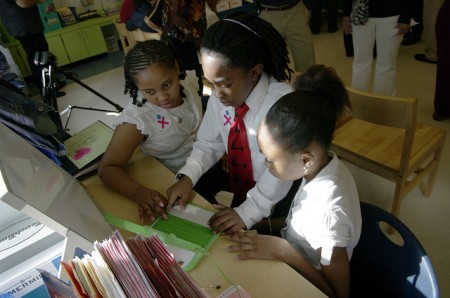
This semester, the
Knight Foundation and One Laptop Per Child are launching a digital literacy effort at Liberty City’s
Holmes Elementary School. Video from the school is
up on Vimeo. And here is the joint
press release:
Every student will receive their own XO laptop today, in an effort to level the digital playing field for more than 525 kids at the school. The XOs will be provided by OLPC, with $245K in support from the Knight Foundation.  Community advocates will present the laptops at 9:30 a.m. today.
“Access to the Internet and digital skills are vital for success in today’s connected world,” said Jorge Martinez, who leads Knight Foundation’s Universal Access Initiative. “We hope the laptops help these eager young minds at Holmes Elementary to become digital natives who are more informed and engaged in their classrooms and their community.”
OLPC will provide in-house training at the school for parents, teachers and students on how to use the computers to advance students’ learning. The laptops have tools that let students and teachers to work more closely together. Students can follow their teacher’s work on their laptop, or work collaboratively on projects. OLPC is also assisting in creating a localized curriculum to help kids meet their academic benchmarks.
“We are pleased to be working with Knight Foundation and the Miami-Dade County public schools on this new OLPC education initiative in the U.S.,” said Rodrigo Arboleda, chairman and CEO of the OLPC Association. Â “We believe that partnering with foundations, the private sector and the public sector is an excellent model that can be replicated across the country.”
Holmes Elementary School, which serves the majority of Liberty City residents, is at risk of closing at the end of the year if its state test scores do not improve. In an effort to boost performance, a variety of tools and resources are being used to enhance teaching and learning, including the laptops and training program.
“With this project, every child will carry learning in the palm of their hands and we will be one step closer to leveling the educational playing field in Miami,” said Atunya Walker, Holmes Elementary School’s principal. Holmes Elementary has been selected because it is already working with Knight-funded Teach For America to change student performance. Knight provided funding to triple the amount of Teach for America teachers in Miami-Dade – bringing the number to 350 – in a group of inner city schools that includes Holmes.
See the video about this project.
There are natural assessments built into the program, with a fairly short timeframe, thanks to existing conditions at the school and their risk of closure. And I am honored by the involvement of the Knight Foundation, which has been thinking about issues of access to tools and information in the US for a long time.





